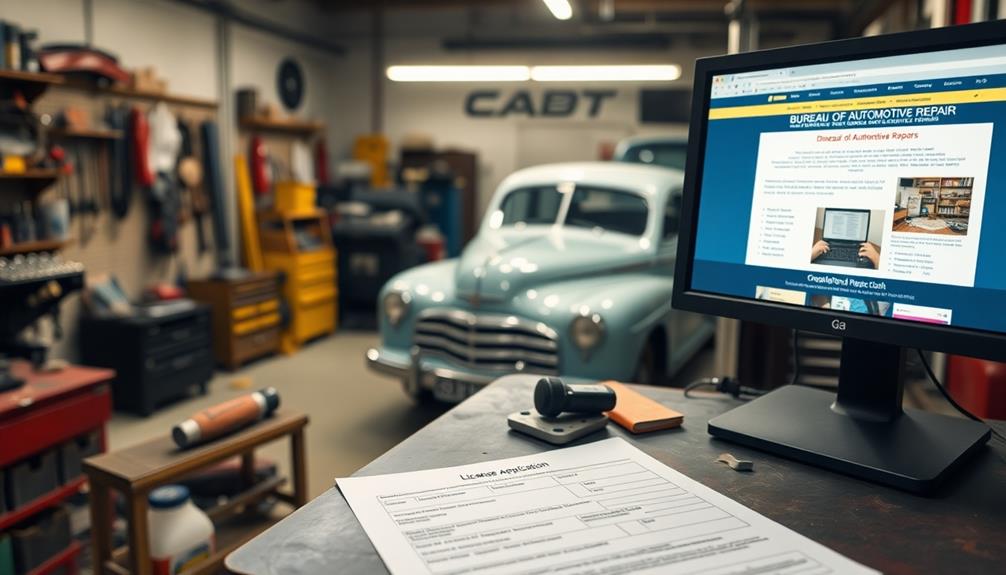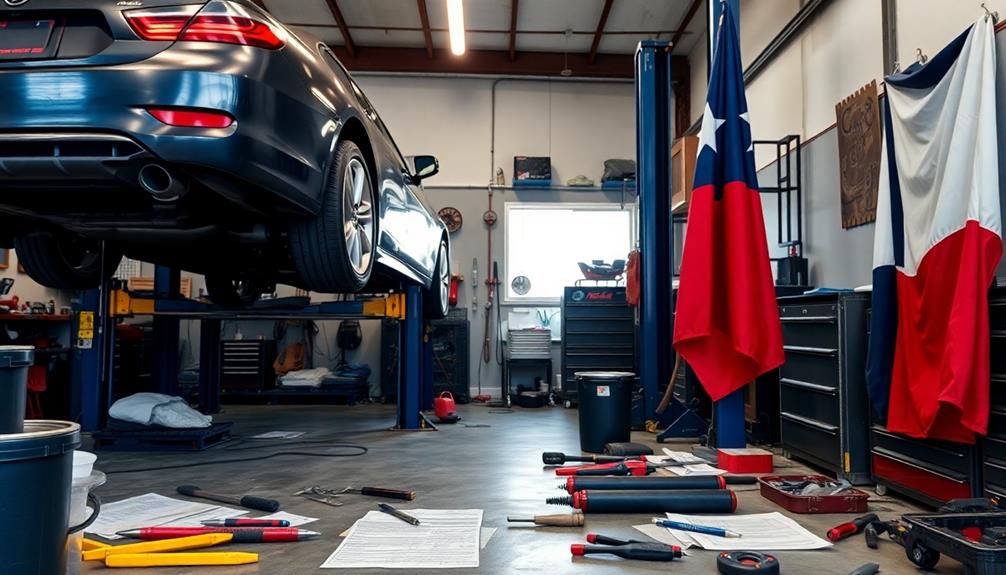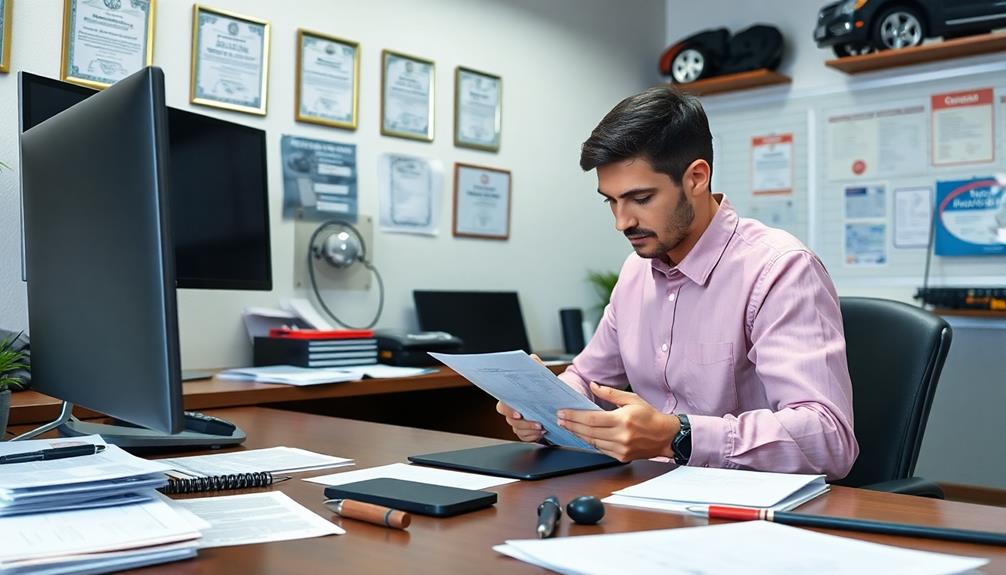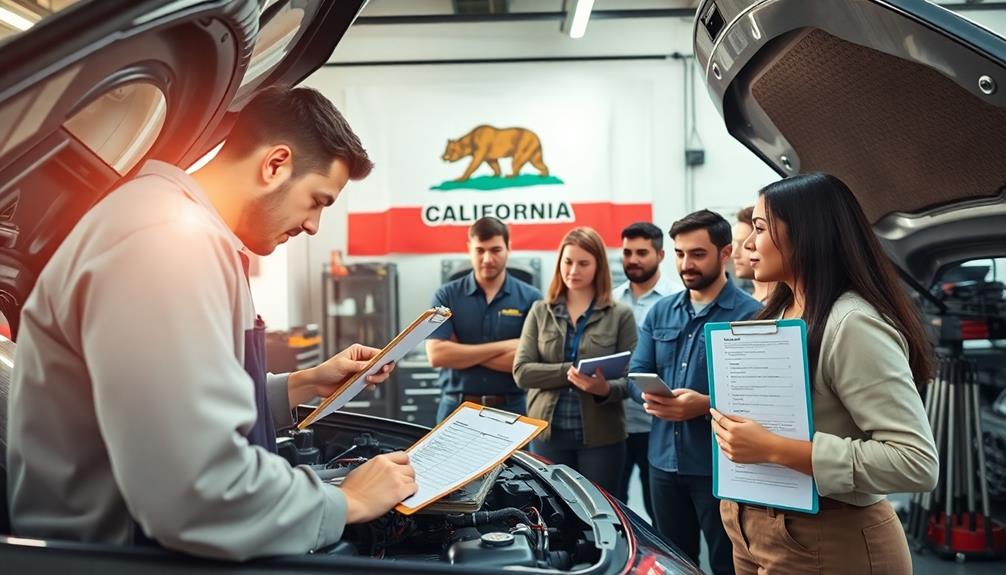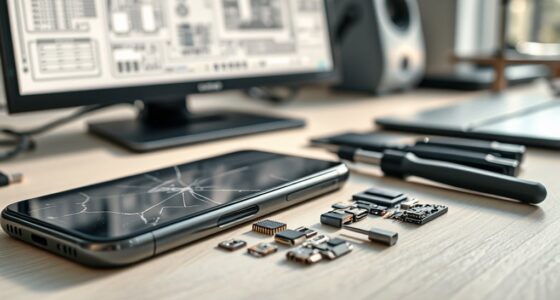To get your Bureau of Automotive Repair license, start by preparing to pay an initial fee of $569.59 and undergoing a criminal background check. You'll need to submit your application either in person or by mail, along with necessary documents like a Certificate of Occupancy. Keep in mind that your license is valid for only one year, so timely renewal is essential. Compliance with regulations and annual inspections is mandatory to maintain your license. Following this process guarantees you operate legally in the automotive repair industry. If you want more details about compliance and renewal, there's plenty to explore.
Key Takeaways
- Apply for the Bureau of Automotive Repair license in person or by mail, including necessary documents like a Certificate of Occupancy.
- Pay the initial license fee of $569.59 and undergo a mandatory criminal background check.
- Renew the license annually with a fee of $546.34; renewals must occur within 30 days to avoid reapplication.
- Display the Bureau license visibly at your premises at all times as required by regulations.
- Be aware of compliance guidelines and prepare for annual inspections by the Bureau to maintain operational legality.
Licensing Requirements and Fees

To operate a business in motor vehicle and trailer repairs, you'll need a Bureau of Automotive Repair license. This license is indispensable for those engaged in mechanic and bodyshop work, guaranteeing you meet specific licensing requirements.
First, you'll need to pay an initial license fee of $569.59. Licenses are valid for one year, after which you'll need to renew it for a fee of $546.34.
Before you apply, be aware that a criminal background check is mandatory for all applicants, including those seeking renewal. This step is significant as it can affect your eligibility for the license.
Additionally, the Bureau of Automotive Repair may conduct annual inspections without prior notice to verify compliance with licensing regulations.
If you fail to renew your license within 30 days after its expiration, you'll have to re-apply as a new applicant, which can be time-consuming and costly.
Staying on top of these licensing requirements is essential for your business's smooth operation in the competitive field of motor vehicle repairs. Make certain you understand these requirements clearly to maintain your license and keep your business running effectively.
Application and Renewal Process
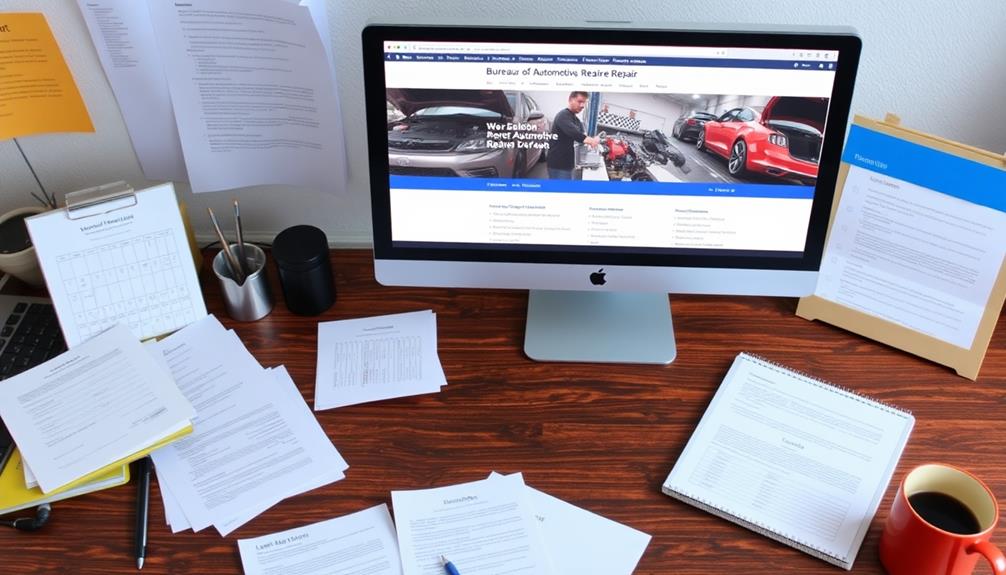
Steering through the application and renewal process for a Bureau of Automotive Repair license is essential for maintaining your business's legality. You can submit your application in person or by mail, ensuring you include necessary documents, such as the Certificate of Occupancy and Articles of Incorporation if applicable.
The initial license fee is $569.59, while renewals cost $546.34, and licenses are valid for one year.
Here's what you need to keep in mind:
- Renewal invoices arrive 30 to 45 days before expiration.
- If you don't renew within 30 days post-expiration, you'll have to reapply as a new applicant.
- The Professions Code mandates that the license must be displayed at your premises at all times.
Background Check Process
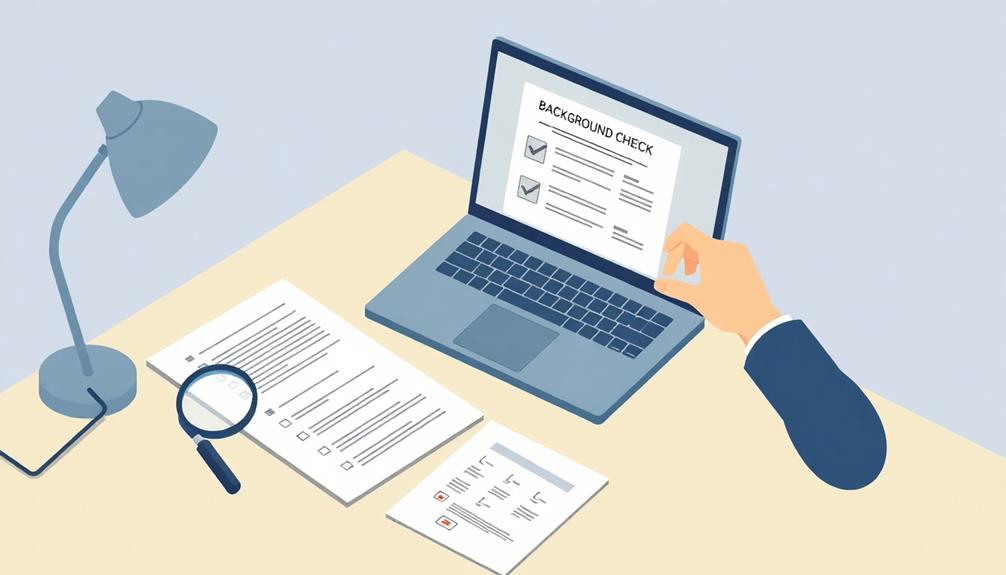
A criminal background check is an essential step in obtaining or renewing your Bureau of Automotive Repair license. This process is mandatory for all applicants, and the results can greatly influence your application.
To guarantee a smooth process, you need to provide accurate and complete information during the background check. Any discrepancies might lead to delays in your application or renewal.
Once you submit your application, the background check results must be reviewed and cleared before you can receive your license. If your background check fails, it's important to contact the Auto Dealers for further instructions on how to proceed. They'll guide you through the next steps based on your specific situation.
It's important to account for the time required for the background check results to be processed when applying for a new license or renewing an existing one. This timeline may affect when you can start operating under your Bureau of Automotive Repair license.
Keep this in mind to avoid any unnecessary delays in your application process. Being proactive and organized will help you navigate this significant step effectively.
Compliance and Inspections
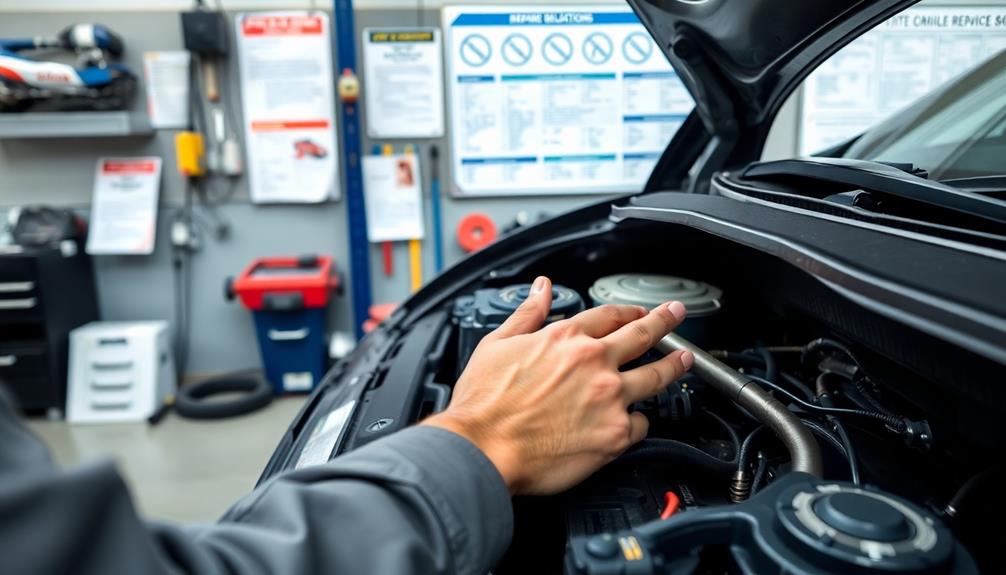
After completing the background check, maintaining compliance with the Bureau of Automotive Repair regulations becomes your next priority.
Staying compliant isn't just about paperwork; it's about following standards that keep your business running smoothly and your customers satisfied.
You'll need to guarantee that your Bureau of Automotive Repair license is always visibly displayed on your premises.
Remember, unannounced inspections can occur at any time, so it's vital to keep your operations in order year-round.
Here are a few key compliance aspects to keep in mind:
- Your facility is subject to annual inspections, which may happen without prior notice.
- Timely renewal of your license is essential; if you fail to renew within 30 days of expiration, you'll have to reapply as a new applicant.
- A notice of public hearing will be published for new business applications, allowing the community to voice concerns before licenses are granted.
Exempt Minor Repairs
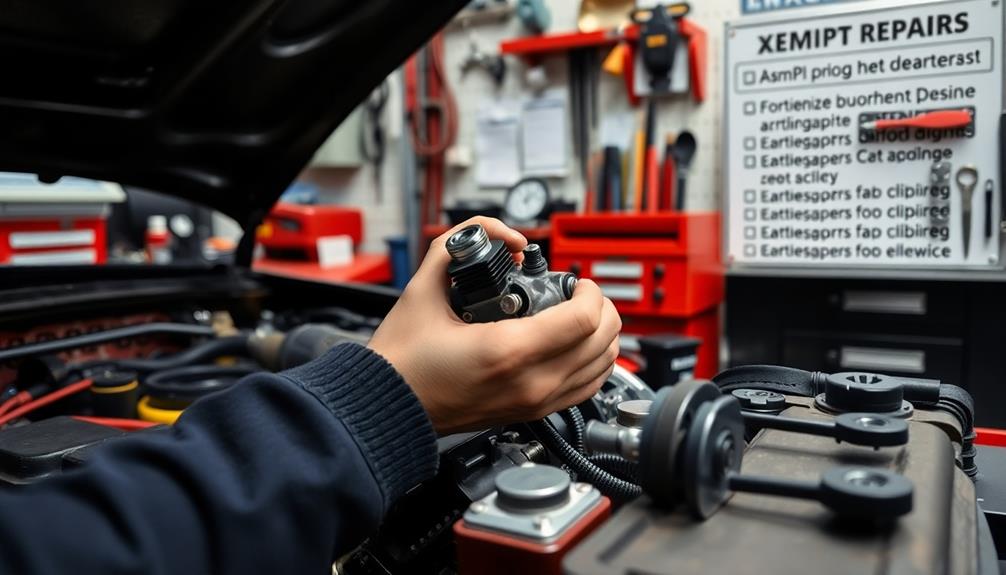
When it comes to minor repairs, you'll be pleased to know that many tasks don't require Bureau of Automotive Repair (BAR) registration.
Things like tire replacements, bulb installations, and routine lubrication can be handled without a license.
Understanding these exempt repairs can save you time and effort in your automotive work.
Exempt Repair Types
Understanding exempt repair types is essential for those in the automotive service industry. Knowing which repairs don't require Bureau of Automotive Repair (BAR) registration can save you time and resources.
Here are some key exempt repair types you can perform without needing to register:
- Tire repairs and replacements: You can handle basic tire services without any registration.
- Lubrication services: Offering lubrication for vehicles is allowed and doesn't require BAR registration.
- Installation of components: You can replace parts like bulbs, batteries, and wiper blades freely.
Additionally, minor adjustments, such as cleaning and replacing spark plugs, are exempt under certain conditions.
If you're working under a business agreement between dealers and businesses, those repairs also don't require registration.
This flexibility allows you to provide essential services without the bureaucratic hurdles, making it easier to meet your customers' needs efficiently.
Registration Necessity Overview
Guiding through the registration requirements for automotive repairs can be straightforward, especially when you focus on exempt minor repairs. These repairs are tasks you can perform without needing a Bureau of Automotive Repair (BAR) license. Understanding what qualifies as an exempt minor repair helps simplify your operations.
Here's a quick overview of common exempt minor repairs:
| Repair Type | Registration Requirement |
|---|---|
| Tire repairs and replacements | Not required |
| Lubrication of vehicles | Not required |
| Installation of bulbs, batteries, and wiper blades | Not required |
You're also free to make minor adjustments, like spark plug replacements and cleaning tasks, without registering. Additionally, any repairs conducted under business agreements between dealers and businesses are exempt from BAR registration requirements.
Regulatory References

To successfully navigate the licensing process, you need to understand the legal framework established by the Business & Professions Code, specifically sections 9880-9880.3.
This code not only outlines compliance guidelines for automotive repair dealers but also offers resources for resolving disputes.
Familiarizing yourself with these regulatory references is essential to guarantee your business operates fairly and legally.
Legal Framework Overview
Maneuvering the legal landscape for obtaining a Bureau of Automotive Repair (BAR) license can be complex, but it's essential for ensuring compliance with industry standards.
The Business & Professions Code, Automotive Repair sections 9880-9880.3, lays out the legal requirements you need to follow. This code is your primary resource, detailing everything from registration to maintenance of your BAR license.
Here are some key points you should know:
- Registration Necessity: Certain repairs require specialized mechanical expertise, demanding BAR registration for those services.
- Consumer Protection: These regulations help protect consumers and facilitate dispute resolution, making them a significant part of your operation.
- Compliance Importance: Understanding the legal framework is critical for successfully maneuvering the licensing process and ensuring your business meets all legal standards.
Compliance Guidelines Explained
Understanding the compliance guidelines is critical for managing the BAR licensing process effectively. The Business & Professions Code, specifically sections 9880-9880.3, lays out the legal framework that governs automotive repair licensing and operations. As a potential licensee, you need to familiarize yourself with these regulations to guarantee fair practices in the industry.
Compliance with these guidelines is essential not just for automotive repair dealers but also for consumers. It helps protect consumer rights and sets clear expectations for the types of repairs that require Bureau of Automotive Repair (BAR) registration. Some repairs may be exempt, and knowing which ones fall into each category will keep you compliant.
Additionally, the code can undergo regular updates, so it's important to stay informed about any changes that could impact your compliance requirements. This proactive approach will help you avoid potential disputes and maintain a good standing with the BAR.
Dispute Resolution Resources
Disputes in the automotive repair industry can arise for various reasons, and knowing how to navigate them is essential for both consumers and dealers.
The Business & Professions Code, Automotive Repair [9880-9880.3], serves as the legal framework that outlines the rights and responsibilities of all parties involved. This code is vital for ensuring compliance with automotive repair standards and clarifying obligations. It provides guidelines that help protect consumers from fraudulent practices and ensures that automotive repair shops operate transparently and ethically. By adhering to these regulations, businesses in the automotive repair and maintenance industry can foster trust with their customers while maintaining the integrity of their operations. In turn, this contributes to the overall safety and reliability of vehicles on the road.
When disputes occur, consumers can refer to the code for guidance on their rights and available remedies.
Here are some key resources you should consider:
- File a complaint: Utilize the Bureau of Automotive Repair's complaint process to address grievances formally.
- Mediation services: Explore mediation options that can help resolve disputes amicably without escalating to legal action.
- Consumer protection agencies: Reach out to state or local consumer protection agencies for additional support and resources.
Frequently Asked Questions
What Permits Do I Need to Open a Mechanic Shop in Texas?
To open a mechanic shop in Texas, you'll need a Bureau of Automotive Repair license, a Certificate of Occupancy, and possibly Articles of Incorporation. Don't forget about the criminal background check as well!
What Does Bureau of Automotive Repair Do?
The Bureau of Automotive Repair guarantees automotive businesses follow state laws, protecting consumers. It conducts inspections, mandates licenses, and oversees compliance, helping you navigate disputes while guaranteeing the legitimacy of services provided in the industry.
Do You Need a License to Be a Mechanic in California?
Think of being a mechanic like steering a ship; you need a license in California to guide your business safely. Without it, you risk running aground with legal troubles. So, yes, you need that license.
What Are the New Auto Repair Laws in Texas?
In Texas, new auto repair laws require businesses to obtain a Bureau of Automotive Repair license, complete background checks, and adhere to specific regulations. You'll need to display your permit and timely renew your license annually.
Conclusion
So, you're all set to plunge into the thrilling world of automotive repair licensing, huh? Just remember, while you're steering through the maze of forms and fees, don't forget to check your sanity at the door. After all, who wouldn't want to spend their days crafting a license that says, "I fix cars, but I'm still not sure how to change a tire"? Embrace the chaos, and may your bureaucratic journey be as smooth as a well-oiled engine!
